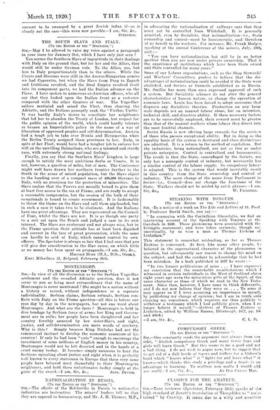THE SOUTH SLAVS AND ITALY.
(To THE EDITOR OF THE " SPECTATOR.")
Sia,—May I be allowed to raise my voice against a paragraph in your issue for January 31st, which I have only just seen ?
You accuse the Southern Slays of ingratitude in their dealings with Italy on the ground that, but for her and the Allies, they would still be under German rule. To the Allies, yes, but less to Italy proportionately than to the others. While the Croats and Slovenes were still in the Austro-Hungarian armies we had Caporetto, but when the Slays from Prag to Zagreb and Liubliana revolted, and the Dual Empire resolved itself into its component parts, we had the Italian advance on the Piave. I have spoken to numerous ex-Austrian officers, who all say that they looked upon the Italian front as a rest-cure compared with the other theatres of war. The Yugo-Slav sailors mutinied and seized the Fleet, thus clearing the Adriatic, and the Italians promptly sank the ` Viribus Unitis.' It was hardly Italy's desire to conciliate her neighbours that led her to abandon the Treaty of London, but respect for the public opinion of the world, which could hardly tolerate so brazen an Imperialistic policy in the name of a war of liberation of oppressed peoples and self-determination. Austria had a tough job to take over Bosnia and Herzegovina when the Berlin Treaty assigned those provinces to her. Italy, in spite of her Fleet, would have had a tougher job to enforce her will on the unwilling Dalmatians, who are a talented and sturdy race, with extremely strong national feelings.
Finally, you say that the Southern Slays' kingdom is large enough to satisfy the most ambitious Serbs or Croats. It is not, however, a question of miles, but of men. The Conference might well have drawn her northern frontier further to the South in the areas of mixed population, but the Slays object to the handing over of a compact mass of 400,000 Slovenes to Italy, with no provision for the protection of minorities. The Slays realize that the Powers are morally bound to give them at least free access to the sea at Fiume, and are ready to accept a reasonable compromise, but the cession of the bulk of their co-nationals is bound to create resentment. It is fashionable to throw the blame on the Slays and call them pig-headed, but in such a case it takes two to fie obstinate. And the Italians have one great advantage. They are represented on the Council of Four, whilst the Slays are not. It is as though one party to a snit sat upon the Bench and judged a case in its own interest. The Slays are exuberant and not always wise, but in the Fiume question their attitude has at least been dignified and correct in the face of great provocation, while the same can hardly be said of Italy, which cannot control its own officers. The Spectator is always so fair that I feel sure that you will give due consideration to the Slav cause, on which little or no money has been spent on propaganda.—I am, Sir, &c., MALCOLM Bean (M.A., D.Sc., Oxon.).
Knez Mihailova 52, Belgrad, February 2Gth.










































 Previous page
Previous page